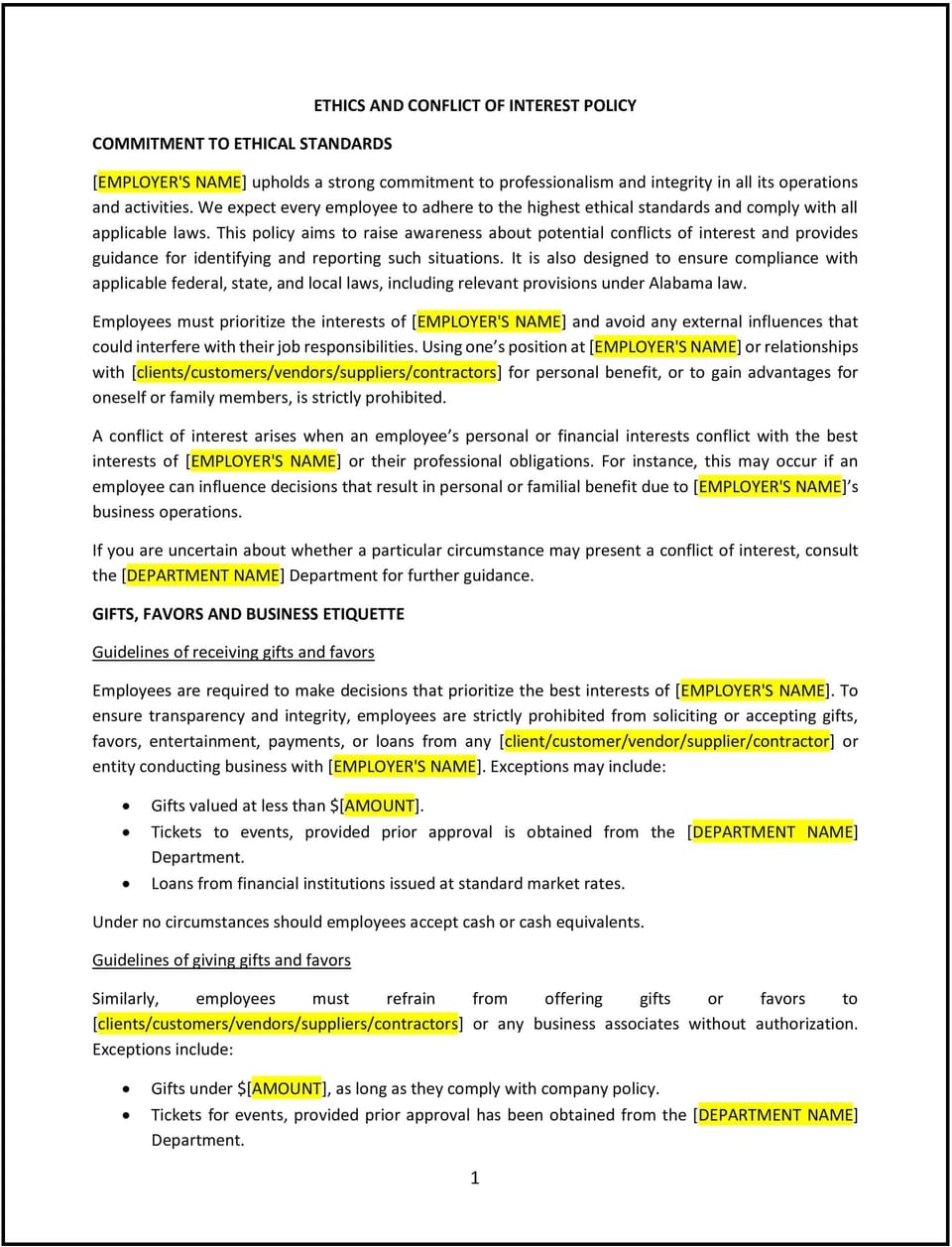Ethics and conflict of interest policy (Alabama): Free template

Ethics and conflict of interest policy (Alabama)
An ethics and conflict of interest policy outlines the principles and guidelines employees should follow to maintain integrity and professionalism in the workplace. For SMBs in Alabama, this policy supports transparency and accountability by addressing potential conflicts between personal interests and organizational responsibilities.
By clearly defining ethical standards and providing procedures for addressing conflicts, this policy helps foster a culture of trust and fairness while safeguarding the company’s reputation and operational integrity.
How to use this ethics and conflict of interest policy (Alabama)
- Define ethical standards: Establish clear expectations for ethical behavior, such as honesty, fairness, and respect in business dealings.
- Identify potential conflicts: Provide examples of conflicts of interest, such as personal relationships with vendors, financial investments in competing businesses, or accepting gifts that could influence decisions.
- Require disclosure: Outline procedures for employees to disclose actual or potential conflicts of interest, including how and to whom disclosures should be made.
- Set resolution processes: Explain how conflicts will be assessed and resolved, ensuring fair and transparent decision-making.
- Emphasize accountability: Clarify that violations of the policy may result in disciplinary actions and encourage employees to report concerns in good faith.
Benefits of using an ethics and conflict of interest policy (Alabama)
A robust ethics and conflict of interest policy strengthens your organization’s integrity and operational effectiveness. Here’s how it helps:
- Builds trust: Demonstrates the company’s commitment to fairness, fostering confidence among employees, customers, and partners.
- Protects the company’s reputation: Reduces risks associated with unethical behavior or perceived conflicts of interest.
- Promotes transparency: Encourages open communication about potential conflicts, supporting a culture of honesty and accountability.
- Ensures consistent decision-making: Provides a structured approach to resolving conflicts, reducing ambiguity in sensitive situations.
- Enhances employee morale: Reinforces the importance of ethical conduct, contributing to a positive and principled workplace culture.
Tips for implementing an ethics and conflict of interest policy (Alabama)
- Provide clear examples: Include specific examples of potential conflicts relevant to your industry to help employees identify and disclose issues.
- Offer training: Conduct regular training sessions on ethical decision-making and conflict resolution to ensure employees understand the policy.
- Make disclosure easy: Create a straightforward process for employees to report conflicts, such as an online form or direct communication with HR.
- Encourage a speak-up culture: Foster an environment where employees feel comfortable raising concerns without fear of retaliation.
- Review and update regularly: Periodically reassess the policy to reflect changes in legal standards, business operations, or industry practices.
Q: What is considered a conflict of interest?
A: A conflict of interest occurs when personal interests interfere with professional responsibilities, such as accepting gifts from vendors or engaging in outside activities that compete with the company.
Q: How should employees disclose potential conflicts of interest?
A: Employees should report potential conflicts to HR or their supervisor through the designated disclosure process outlined in the policy.
Q: Are all conflicts of interest prohibited?
A: Not necessarily. Some conflicts can be resolved through proper disclosure and management, ensuring they do not affect the company’s interests.
Q: What happens if an employee violates this policy?
A: Violations may result in disciplinary action, up to and including termination, depending on the nature and severity of the violation.
Q: Does this policy apply to contractors or vendors?
A: While primarily for employees, the policy may also extend to contractors or vendors, especially when conflicts could impact the business relationship.
Q: How can the company ensure fairness in resolving conflicts?
A: The resolution process should be transparent, involve impartial decision-makers, and focus on protecting the company’s interests while treating employees fairly.
This article contains general legal information and does not contain legal advice. Cobrief is not a law firm or a substitute for an attorney or law firm. The law is complex and changes often. For legal advice, please ask a lawyer.


